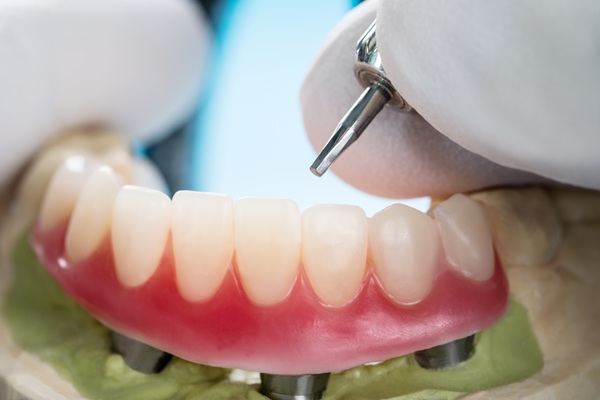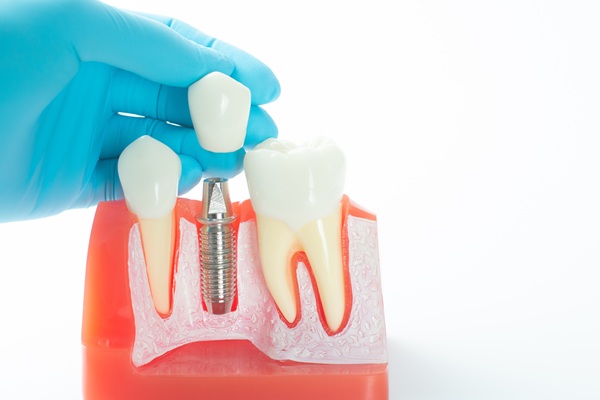How Long Does It Take to Get Dental Implants
 Getting dental implants is a lengthy process that yields desirable results. By replacing both the root and exterior of a missing tooth, this solution restores function, enhances appearance, and preserves the jawbone and gum tissue. Before selecting this treatment option, patients should understand the progression of appointments leading to getting implants and the factors that can extend the duration.
Getting dental implants is a lengthy process that yields desirable results. By replacing both the root and exterior of a missing tooth, this solution restores function, enhances appearance, and preserves the jawbone and gum tissue. Before selecting this treatment option, patients should understand the progression of appointments leading to getting implants and the factors that can extend the duration.
The dental implant process
Dental implants require several appointments to install. From consultation to crown placement, every step is essential to increase the chance of success. Patients can expect at least five appointments:
Consultation
A consultation appointment allows the dental professional to examine the mouth and create a plan. X-rays and impressions are often taken during this visit.
Implant
If the tooth is already removed, the next step is inserting the implant into the jaw. The dental professional makes an opening in the gums, drills into the jawbone, places the screwlike implant into the hole, and closes the gums over the site.
Abutment
After a healing period of about four to eight months, the implant should have fused to the jawbone. The gums can then be reopened to expose the implant and attach an abutment to it. The gums are pushed back over the opening, leaving the abutment poking through.
Impressions
After allowing the area to heal for about two weeks after the abutment procedure, the crown-making process can start. During a short appointment, the dental hygienist takes impressions of the mouth and surgical site and uses a shade guide to select the color of the tooth. This information is sent to a dental lab.
Crown
After the crown is made, it is sent back to the dental office and the patient returns. The crown is either screwed or cemented to the abutment.
Factors that affect treatment time
For the average patient, it takes about six to eight months to get dental implants. However, certain factors can extend the length of treatment:
- Low jawbone density: If an X-ray or CT scan reveals that a patient has experienced jawbone deterioration, a bone graft may be needed to restore volume. It can take several months for the new bone to fuse with the existing structure before implant surgery can take place.
- Tooth extraction: If a tooth needs to be extracted where the implant is being placed, the patient may need a separate appointment to have the tooth removed, which also requires an additional healing period.
- Osseointegration failure: After the implant is placed, the post needs to fuse with the jawbone during a process called osseointegration. In some situations, the body may reject the implant, requiring the surgery to be repeated.
- Crown adjustments: If the dental crown does not properly fit the mouth or is the wrong shade, it needs to be sent back to the lab for adjustments, which can take up to a week.
Conclusion
Getting dental implants can take a long time, especially if additional steps are needed to make the treatment successful. However, the results are long-lasting, allowing the patient to enjoy a beautiful, fully functioning smile for years to come.
Request an appointment or call Rafael E. Cordero, DDS PA at 561-763-9221 for an appointment in our Palm Beach Gardens office.
Recent Posts
Preparing for dental implant recovery is just as important as getting ready for the dental implants themselves. A good recovery sets the stage for successful implants that can last the rest of your life, with few additional changes or fixes. Here is what to expect after a dental implant procedure so you can adjust your…
It is common for people to be self-conscious about their smile, and many do not realize just how big of an impact that expert implant dentistry can have. Implants provide functional and aesthetic benefits that other restorations cannot achieve. The implant process is more in-depth than options like dentures, so the overall outcome is also…
Dental implants are permanent options for replacing missing teeth and repairing one's smile. Instead of contending with the annoying glue of dentures and the risk of them slipping out while talking, patients can enjoy dental devices that function like natural teeth by opting for dental implants. To determine if these are the right choices for…


